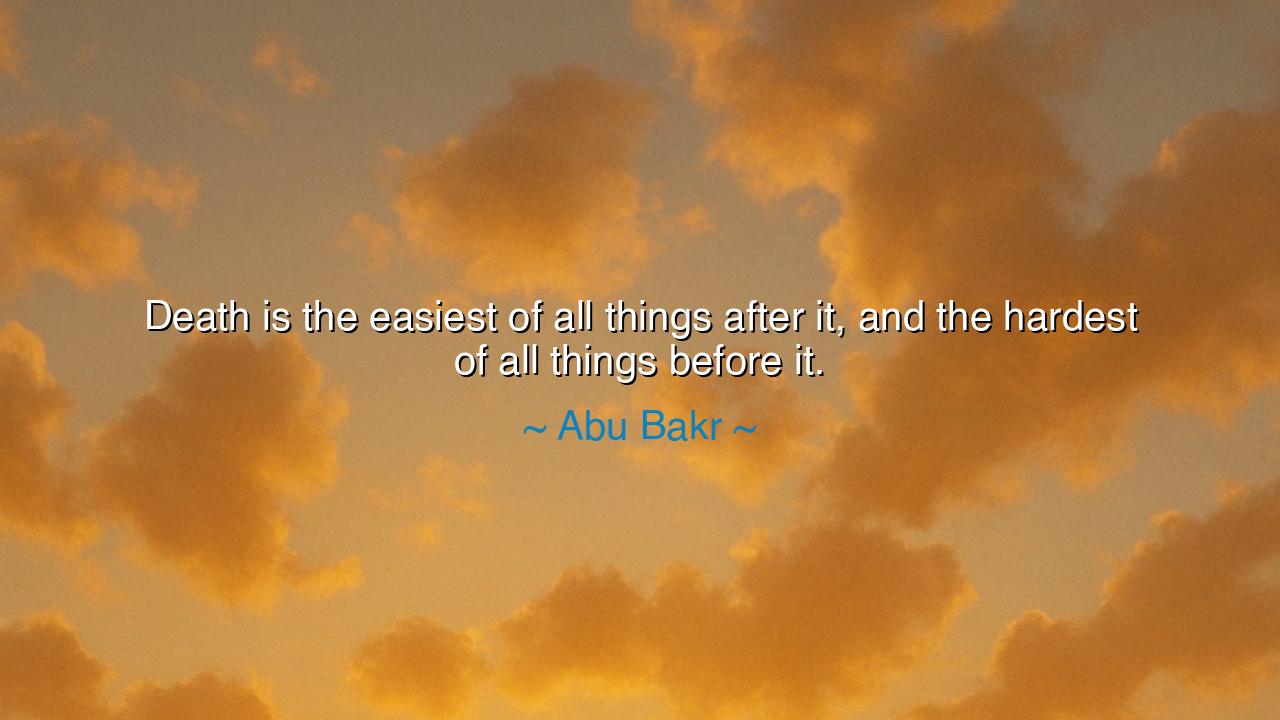
Death is the easiest of all things after it, and the hardest of






In the solemn and timeless words of Abu Bakr, the first Caliph of Islam and one of the most steadfast companions of the Prophet Muhammad, there rests a profound truth about the nature of the human soul: “Death is the easiest of all things after it, and the hardest of all things before it.” These words, spoken by a man who lived through the trials of faith, conquest, and loss, pierce to the heart of human fear. For in them lies the paradox of mortality — that what we dread most in life is, in the end, but a gentle passage; and what torments us is not death itself, but the shadow it casts before it.
The origin of this saying comes from the early years of Islam, a time when death was no stranger to the faithful. Abu Bakr, known for his piety and wisdom, was a man who had faced the sword in battle and the burden of leadership in peace. He had seen friends and family fall, had buried his own loved ones, and had stood firm through the death of the Prophet himself — an event that shook even the bravest hearts. When others wept and despaired, Abu Bakr reminded them, “Whoever worships Muhammad, know that Muhammad has died; but whoever worships God, know that God is ever-living.” It was this clarity — this calm before the ultimate truth — that shaped his view of death not as an end, but as a continuation of the divine journey.
To say that death is easiest after it is to recognize the peace that follows the final surrender. Once the veil is lifted, all struggle ceases; all burdens fall away. The fears that tormented the mind — of loss, pain, and uncertainty — dissolve into silence. It is not death itself that wounds us, but the thought of it — the anticipation, the clinging to life, the desperate refusal to let go of what we know. This is why Abu Bakr calls it “the hardest of all things before it.” The battle lies not in dying, but in accepting the truth that death is inevitable and, perhaps, merciful.
The ancients across many lands shared this wisdom. The philosopher Seneca, writing from the heart of Rome, said much the same: “He who fears death will never do anything worthy of a living man.” He taught that death is not to be fled from, but to be understood — for by confronting it, we learn how to live. The great warriors of every age have known this secret. The samurai of Japan were taught to meditate daily upon death, not to glorify it, but to be free from its terror. Once a man has accepted his mortality, he becomes unshakable. He moves through life with clarity, courage, and serenity, for he no longer fights the inevitable.
Consider the story of Khalid ibn al-Walid, one of Abu Bakr’s contemporaries and one of the greatest generals in history. He fought over a hundred battles and emerged victorious from them all. Yet when his time came, it was not the sword that took him, but illness. As he lay dying, he wept — not from fear, but from longing. “I have sought death on every battlefield,” he said, “but here I die like a camel on my bed.” For him, death was not terror, but the end of striving, the return home after a long and weary journey. The heart that has made peace with death is no longer enslaved by fear; it is liberated to live fully and die nobly.
Abu Bakr’s words remind us, too, of the compassion hidden within the divine design. Death, though feared, is often gentle when it comes — a closing of the eyes, a release of the spirit. It is only while we live that the mind torments itself with images of loss and decay. The fear of death magnifies suffering, but the acceptance of it brings wisdom. Once we see death as a natural part of existence — no more tragic than the setting of the sun — we begin to live without hesitation, to speak truth without fear, and to love without restraint.
So, my child of tomorrow, take this lesson from Abu Bakr and the sages of all ages: do not let the shadow of death darken the brightness of your life. You cannot escape it, but you can meet it with dignity. Reflect often upon your mortality — not in despair, but in gratitude — for it is the awareness of death that gives life its sweetness. Each breath is precious because it will not last forever. Each act of kindness, each word of courage, each moment of love is a victory over the silence that awaits us all.
For as Abu Bakr teaches, death is only hard before it comes; after, it is but peace. Fear not the end, but the unlived life. Prepare your soul not by denying death, but by living so rightly that when it comes, you may greet it as an old friend. Then, when your time arrives, you will not tremble — for you will know that nothing has been lost, and everything that truly matters has already been fulfilled.






AAdministratorAdministrator
Welcome, honored guests. Please leave a comment, we will respond soon